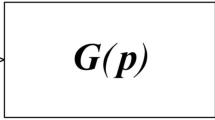Abstract
In the paper, maximum principle for a two-directionally continuous variant of a linear autonomous repetitive process with cost functional depending on a fixed “end-function” is obtained. Maximum condition has a pointwise form, a conjugate system has a Fornasini-Marchesini form. The result is derived from the extremum principle for smooth-convex problems, due to Ioffe and Tikhomirov.
Similar content being viewed by others
References
Alekse’ev, V. M., Tikhomirov, V., & Fomin, S. V. (1979). Optimal control. Moscov: Nauka (in Russian).
Idczak, D. (1990). Optimization of nonlinear systems described by partial differential equations. Doctoral Thesis, University of Łódź, Łódź.
Idczak D. (1995). Optimal control of a continuous Roesser model. Bulletin of the Polish Academy of Sciences, Technical Sciences 43(2): 227–234
Idczak D. (1996). Necessary optimality conditions for a nonlinear continuous n-dimensional Roesser model. Mathematics and Computers in Simulation 41, 87–94
Idczak, D. (2005). On a continuous variant of a linear repetitive process. In Proceedings of the Fourth International Workshop on Multidimensional Systems – NDS 2005, Wuppertal (Germany), pp. 247–252.
Ioffe A., Tikhomirov V. (1979). Theory of extremal problems. Amsterdam, North-Holland
Owens D.H., Amann N., Rogers E., French M. (2000). Analysis of linear iterative learning control schemes – a 2D systems/repetitive processes approach. Multidimensional Systems and Signal Processing 11(1/2): 125–177
Rogers, E., Gałkowski, K., & Owens, D. H. (2007). Control systems theory and applications for linear repetitive processes. In Lecture Notes in Control and Information Sciences, Vol. 349. Berlin, Heidelberg, New York: Springer-Verlag.
Rogers, E., & Owens, D. H. (1982). Stability analysis for linear repetitive processes. In Lecture Notes in Control and Information Sciences, Vol. 175, Berlin, Heidelberg, New York: Springer-Verlag.
Walczak S. (1987). Absolutely continuous functions of several variables and their applications to differential equations. Bulletin of the Polish Academy of Sciences, Mathematics 35(11–12): 733–744
Walczak S. (1988). On the differentiability of absolutely continuous functions of several variables. Remarks on the Rademacher theorem. Bulletin of the Polish Academy of Sciences, Mathematics 36(9–10): 513–520
Author information
Authors and Affiliations
Corresponding author
Rights and permissions
About this article
Cite this article
Idczak, D. Maximum principle for optimal control of two-directionally continuous linear repetitive processes. Multidim Syst Sign Process 19, 411–423 (2008). https://doi.org/10.1007/s11045-007-0036-x
Received:
Revised:
Accepted:
Published:
Issue Date:
DOI: https://doi.org/10.1007/s11045-007-0036-x




